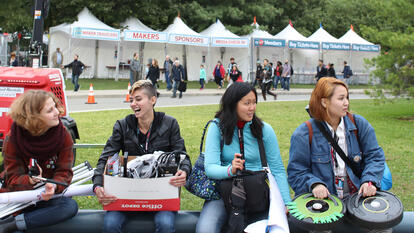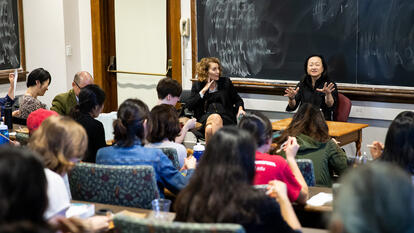
Wellesley Student and Alumnae Awarded National Science Foundation Fellowships for Doctoral Study
Six Wellesley alumnae and one current student were recently awarded National Science Foundation (NSF) graduate research fellowships to support doctoral study in STEM (science, technology, engineering, and mathematics) fields. The highly competitive fellowship provides three years of funding, including a $34,000 annual stipend and a $12,000 allowance for tuition and fees, as well as opportunities for international research and professional development. Recognizing students of outstanding potential, the awards aim to help ensure the vitality and diversity of scientific research in the United States.
Wellesley had among the highest number of NSF grant recipients among liberal arts colleges this year. All seven grantees are or will be pursuing doctorates in their fields, which include economics, public policy, computer science, astrophysics, structural biology, and cognitive neuroscience. These women will join a long line of Wellesley alumnae who have earned doctorates in the sciences.
“The Wellesley STEM environment is rare,” said grant recipient Catherine Nicoloff DS ’19, who plans to pursue a PhD in experimental nuclear astrophysics. “I do not think I would be in physics if I had attended a coeducational institution. Because I was given a chance to know my professors and be known by them, and because I experienced the classroom environment as cooperative, I was able to develop the confidence that will allow me to transition effectively into a PhD program.”
Wellesley alumnae are awarded more science and engineering doctorates than female graduates of any other liberal arts college in the nation—and the College is highly ranked in the Oberlin 50, a group of liberal arts colleges that have dominated NSF rankings of schools sending their students on to PhD programs, producing twice as many students who earn a PhD in science per capita than other institutions. The College’s rate of NSF awards and graduates who enter science PhD programs is “a testament to the value of a liberal arts education in general, and to the value of a women’s college education in particular,” said Kristin Butcher ’86, Marshall I. Goldman Professor of Economics at Wellesley.
“These are terrific students who went through a broad and rigorous undergraduate curriculum. They had terrific classroom teachers who also have vibrant research portfolios, so the students had opportunities to be meaningfully involved in research as undergraduates, and they sought and received mentoring even after they graduated from Wellesley,” Butcher continued.
Below, the 2019 NSF grant awardees discuss their time at Wellesley, future plans, and research:
Catherine Nicoloff DS ’19
Nicoloff will enter graduate school in the fall to pursue a PhD in experimental nuclear astrophysics. Her fascination with physics began in courses at Massasoit Community College, then solidified during research experiences at the University of Notre Dame, Brookhaven National Laboratory, and Wellesley. Her work in professor James Battat’s lab, where she developed a prototype directional dark matter detector, and his mentorship convinced her to pursue graduate research. The NSF funding will reduce her teaching assistantship duties, enabling her to pursue another of her passions: physics outreach, especially among first-generation, nontraditional, and students with disabilities.
Madeleine Anna Barowsky ’18
A math and computer science major at Wellesley, Barowsky will be attending Harvard University in the fall to pursue a PhD in computer science. Her research will focus on AI fairness, privacy, and cryptography, interests sparked in a cryptography and privacy seminar she took at Wellesley with mathematics professor Ismar Volić. She cites the warmth, support, and continuing mentorship of professors in both the mathematics and computer science departments, as well as the grit, and time management and teamwork skills she honed as a member of the varsity fencing team, for effectively preparing her for graduate study. (Barowsky has declined the NSF fellowship and accepted another grant.)
Kelsey Moran ’17
Drawn to the way economics mixes mathematical methods and historical social questions, Moran attributes her decision to pursue a PhD in economics to research assistantships and excellent courses at Wellesley, especially an econometrics course taught by Kartini Shastry, associate professor of economics. In her senior honors thesis, she used econometric methods to examine the impact of immigration on health care for the elderly. She is currently revising the project into an article co-authored with professor Kristin Butcher, her thesis advisor. At MIT this fall, she will continue her research on the long-term elderly care market, and the potential effects of labor supply shocks on health care and immigration policy.
Heather Kosakowski DS ’17
Kosakowski is a second-year graduate student in cognitive neuroscience at MIT, where she studies the infant brain and the developmental origins of object recognition, language, and music. “At birth, the human infant brain weighs less than one pound. As infants become children and then adults, that tiny piece of tissue grows and expands to three times its birth size and is responsible for housing our entire experience as a human being,” she said. “Every bit of knowledge, every cognitive capacity, and every thought humans have is a result of what is and isn’t stored by the billions of neurons in our brain. I find that amazing!” A Marine Corps veteran and single mother, Kosakowski credits her life experiences; professors in neuroscience, biology, computer science, and physics; fellow Wellesley students; and her undergraduate research at MIT’s Center for Brain, Minds, and Machines (CBMM) for shaping and encouraging her pursuit of a neuroscience doctorate.
Erin Yang ’16
Yang entered Wellesley as an economics major and graduated as a chemistry major with an economics minor. While economics offered explanations for and ways to solve real-world issues, chemistry in its own way provided “different models that explained how the world worked,” she said. Courses she took with Mala Radhakrishnan, associate professor of chemistry, honed and “solidified [her] fascination with the physical forces that govern protein structure and function.” Although her interest in economics never faded—she worked for two years at an economic consulting firm in D.C. managing pharmaceutical and medical device companies—she missed natural sciences research. Currently a first-year PhD student in biochemistry at the University of Washington, Yang will use her NSF funding to continue designing new proteins that can be applied in a variety of ways, from novel therapeutic delivery systems to clean-energy tools.
Micah Villarreal ’15
Villarreal began her first year at Wellesley interested in international relations, but a series of economics courses, and early exposure to research opportunities inspired a passion for applying econometric tools to contemporary social problems. Following generous post-graduate mentorship from Wellesley faculty such as professor Kristin Butcher, she will begin a PhD program in economics at the University of California, Santa Barbara in the fall. Her research will focus on exploiting macro-level economic shocks to better understand phenomena impacting persons living in public housing. The fellowship, which relieves her of T.A. duties, will also afford her the time to serve as a mentor to women and students of color on campus.
Emma Rackstraw ’14
Rackstraw got hooked on economics in professor David Lindauer’s Principles of Microeconomics course as a Wellesley first-year. Lindauer continues to be a mentor and advocate, alongside other economics faculty, including professors Kristin Butcher, Patrick McEwan, Akila Weerapana, and Phillip Levine. “I don’t think I would have majored in economics at another school,” she said. “Economics is a bit of a boys’ club, and at many schools it is a feeder for banking and finance jobs.” But Rackstraw said the exceptionally supportive Wellesley faculty and their ability to apply economic research to public policy issues, as well as being “surrounded by other female-identifying economics majors,” helped her feel like she belonged in the economics community. Rackstraw will pursue a doctorate in economics and public policy at the Harvard Kennedy School, where her research will focus on using economic concepts to detect discrimination in law enforcement and criminal justice reforms.



